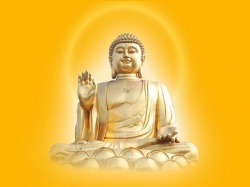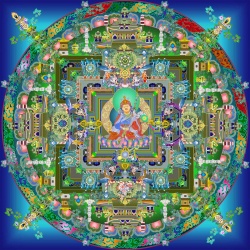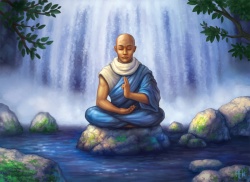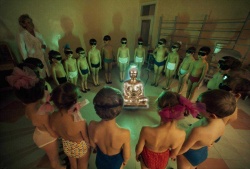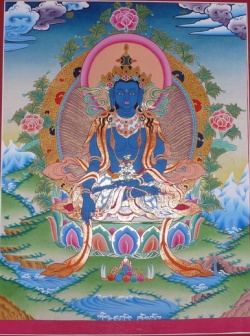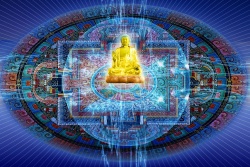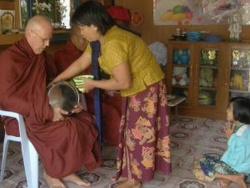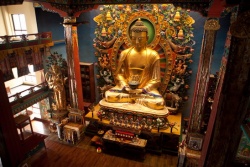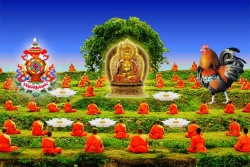Mythologised
University of Tennessee-Knoxville
Honors 2118: Myth
Fall 1975 (December 1975)
I have dealt elsewhere with the problem of freedom in relation to myth as a way of life and with "free Thought" and the relationship between thought and myth. [See Myth, Archetype, and the Problem of Freedom.]
But, despite all I have said about the admission of weakness one makes by choosing to live according to myth (see Mann)[1] and about the inability to reach reality in any thought (since, where there is thought, there is man's artificial, ideal world, which equivalent to mind),[2]
I have come to the conclusion that a worldview is necessary for life, that thinking is necessary for a worldview to exist, and that myth is a very good way of thinking insofar as one must think.
The world is necessary for life simply because a fundamental property of life is growth, and growth in its highest stage has produced man who, in order to survive as a species, has to communicate and has to have a common world or mental construct in order to be able to communicate.
Thus, he did and does have to think, just as he had to develop reason in order to be able to manipulate a language of common symbols.
Were there no reason, thought, or language, there were no world, and life would not be able to advance beyond the irrational, instinctual, animal stage.
Modern man must think, although it is desirable (as I have mentioned elsewhere) to be able to control one's mind and thought to the point of stopping it at will; furthermore, when one does think, it is desirable to think as well as possible.
Thinking along mythical lines is a very good way of thinking, if not the best.
To understand myth as a way of thinking, it is best to understand it in terms of the durative and the punctual.
Theodor Gaster says that the function of myth is "to bring out in articulate fashion the inherent durative significance of the ritual program."[3]
(The "ritual program" is, in particular, a series of seasonal rituals performed by primitive man to aid in the cyclic passing of seasons and thus the renewal of life.)
Myth achieves this by "projecting the procedures of ritual to the plain of ideal situations," by translating "the real into terms of the ideal, the punctual into terms of the durative and transcendental."[4]
This means that myth represents on the timeless, transcendental plane what is acted out in ritual on the temporal or everyday plane. Acting in rituals gives meaning to acts by relating them to the absolute.
Gaster writes that myths accompany rituals and present these "purely functional acts" of ritual "in durative terms."[5]
A philosophy is a theory of life, an understanding of life and what it means. True philosophy provide for its own application to everyday life.
In durative/punctual terms, each day is punctual and, while it is transcended by durative life on the whole, each day goes to make up that life – data-to-day living is the living of that durative life: it is that life. Philosophy, then, can be thought of as being an orientation of life to the absolute.
Each day of life is lived in accord with a transcendental goal, a purpose, a theory and meaning of life.
This is ritual. The expression of the absolute goal in terms, symbols or images is myth.
Malinowski called myth "a way of coping," and, in this light, it is true that myth gives an over-all meaning, direction, and purpose to a life that would otherwise be (thought of as being) meaningless.
But ritual action need not be repetitive.
Action is only ritual in the sense that it is related to the durative; one's theory is held in mind and applied through action.
It is not representational (as in drama) or ceremonious ritual (as in religion), although all of one's acts heave a religious significance when orientated philosophically (that is, in ones' thoughts) to the absolute.
When people share a mythology or a body of myths, then their society is cohesive because they have a common purpose in life. Cassirer discusses Durkheim's idea that "not nature but society is the true model of myth."[6]
And yet, while seeming to agree with this, Cassirer later writes that "to mythical and religious feeling nature becomes one great society, the society of life"[7]
and that to the primitive man "nature and society are not only interconnected by the closest bonds; they form a coherent and indistinguishable whole."[8]
Now, for these ideas to work together, it must be understood that nature as modern man sees it was not the nature that primitive man saw. Primitive man, seeing society and nature as one, and nature as a society (of life),
lived not in nature as we see it but in a society, so that his myths would necessarily be modeled after the society and no after nature (as we understand nature to be: distinct from society).
Malinowski writes that "the realm meaning, in fact the full account," of myth "is contained in the traditional foundations of social organization"[9] and that "the reality of myth lives in its social function."[10]
Myth does not explain (in order to comprehend) natural phenomena, but rather shows man confronting these phenomena.
The lasting effect of these confrontations – as recorded in myth – is felt in the ritual life of men, for myth "is not a story told but a reality lived"[11] and in functioning "it vouches for the efficiency of ritual and contains practical rules for the guidance of man."[12]
I speak of ritual as myth in action. But myth as thought must precede myth as action.
Malinowski writes: "The beginning of man is the beginning of articulate thought and of thought put into action."[13]
This relates to myth and ritual in that myth is a way of thinking that ritual a way of acting out myth or of acting in accordance with myth.
Myth and ritual are highly developed, expressive ways of thought and thought-put-into-action, respectively, and therefore are potential media for creative, artistic self-expression.
Acting in accord with the beliefs which one constructs for oneself is individual and unique action insofar as those believes come from one's innermost self.
One is better for one's belief, and one's actions take on an air of certainty and decisiveness.
Where myth is an integral cultural aspect of a social organization, acting out myth is living in a society and in accord with its culture, customs, etc.,
Myth as a way to thinking unifies the society by providing a common purpose – that of enacting, through ritual, on the punctual level that which, in myth, is on the idea or theoretical or durative level.
This mythical thought, once again, is philosophical in that it orients life and the actions fad experience of life (utilizing belief and hence a controlling imagery)[14] to the overarching theory or purpose of life as a whole. Joseph Campbell writes that myth carries man forward.[15]
Concerning myth as action, Cassirer writes that myth's "vital principle . . . is a dynamic not a static one; it is describable only in terms of action."[16]
"The world of myth is a dramatic world – a world of actions, of forces, of conflicting powers."[17]
He existentialists, especially Kierkegaard and Heidegger, have long stressed the importance of action –action that has its root in reflective thought.
The highly existential don Juan Matus of Carlos Castaneda's writings[18] strongly stresses the need to think out all of the consequences of an action (since every action can lead to death), then to act, and then to assume responsibility for the action without regrets or remorse for having made it.[19]
Don Juan's world is a world of power in which death is the hunter, in which forces guide our lives, and in which, for mortal man, there is time only for decisions and actions.[20]
Each act has the meaning of being one's last act on earth; the punctual moment of life is all of life – the punctual is perfectly oriented to the durative in this respect.
Once a life has begun, the completion of that life is at hand at every moment, so that the whole of one's life is in mind at the time of each action.
Don Juan, then, is perhaps an ideal example of the philosopher, using our special definition of philosophy as orientation of the punctual moment of life to the durative life as it transcends the moment.
This is reaching for all of one's life as well as reaching for the absolute. Thinking in such a way makes one more aware of the passing of one's life and of all of the possibilities of action in accord with one's self-determined goal, one's chosen path in life.
Footnotes
[1] Thomas Mann, "Freud and the Future" (1937). In Henry Murray, ed., Myth and Mythmaking. Boston: Beacon Press, 1968. 371-75.
[2] Cf. Swami Vishnudevananda, The Complete Illustrated Book of Yoga (New York: Julian Press, 1960); Carlos Castaneda, Tales of Power (New York: Simon & Schuster, 1974); et al concerning the stopping of thought and the equation of mind=world.
[3] Theodor Gaster, Thespis: Ritual, Myth and Drama in the Ancient Near East (New York: Harper & Row, 1961), 77.
[4] Ibid. 24.
[5] Ibid., 16.
[6] Ernest Cassirer, An Essay on Man: An Introduction to a Philosophy of Human Culture (New Haven: Yale University Press, 1944), 79.
[7] Ibid., 73.
[8] Ibid., 110.
[9] Bronislaw Malinowski, Magic, Science and Religion and Other Essays (Garden City, New York: Doubleday, 1948), the essay "Myth in Primitive Psychology" (93-148), 115.
[10] Ibid., 117.
[11] Ibid., 100.
[12] Ibid., 101.
[13] Ibid., 148.
[14] Cf. Mark Schorer, "The Necessity of Myth.". In Henry Murray, ed., Myth and Mythmaking (Boston: Beacon Press, 1968), 354-8.
[15] Joseph Campbell, "The Historical Development of Mythology." In Henry Murray, ed., Myth and Mythmaking (Boston: Beacon Press, 1968), 19-45.
[16] Cassirer, 79.
[17] Ibid., 76.
[18] Carlos Castaneda, The Teachings of Don Juan: A Yaqui Way of Knowledge (1968), A Separate Reality: Further Conversations with Don Juan (1971), Journey to Ixtlan: The Lessons of Don Juan (1972), Tales of Power (1974) – all from Simon & Schuster, New York.
[19] Journey to Ixtlan; chapters 4, 5, and 9 deal with the immediacy of death, assuming responsibility, and one's last act on earth, respectively.
[20] Ibid., 40, 85-6, 227.
Professor's Comments: A strange journey - from Gaster to Castaneda – but a fascinating one. I'm delighted that you can use your reading this effectively; and you do, in this paper, set up definitions of myth that show its special kind of thinking. Grade: A. [Dr. Nancy Goslee]
